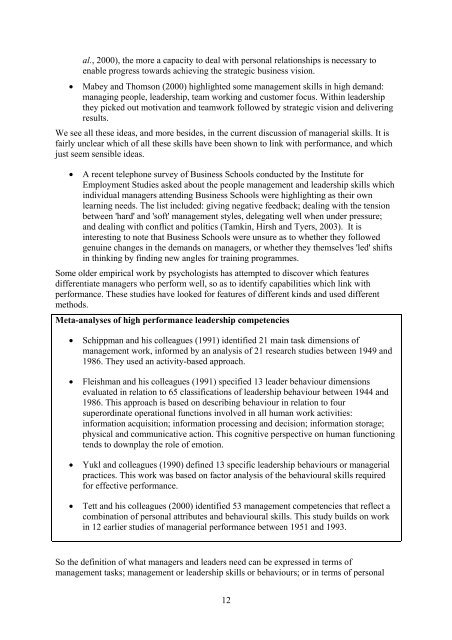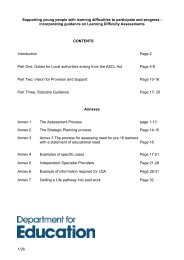The Development of Management and Leadership Capability and its ...
The Development of Management and Leadership Capability and its ...
The Development of Management and Leadership Capability and its ...
Create successful ePaper yourself
Turn your PDF publications into a flip-book with our unique Google optimized e-Paper software.
al., 2000), the more a capacity to deal with personal relationships is necessary to<br />
enable progress towards achieving the strategic business vision.<br />
• Mabey <strong>and</strong> Thomson (2000) highlighted some management skills in high dem<strong>and</strong>:<br />
managing people, leadership, team working <strong>and</strong> customer focus. Within leadership<br />
they picked out motivation <strong>and</strong> teamwork followed by strategic vision <strong>and</strong> delivering<br />
results.<br />
We see all these ideas, <strong>and</strong> more besides, in the current discussion <strong>of</strong> managerial skills. It is<br />
fairly unclear which <strong>of</strong> all these skills have been shown to link with performance, <strong>and</strong> which<br />
just seem sensible ideas.<br />
• A recent telephone survey <strong>of</strong> Business Schools conducted by the Institute for<br />
Employment Studies asked about the people management <strong>and</strong> leadership skills which<br />
individual managers attending Business Schools were highlighting as their own<br />
learning needs. <strong>The</strong> list included: giving negative feedback; dealing with the tension<br />
between 'hard' <strong>and</strong> 's<strong>of</strong>t' management styles, delegating well when under pressure;<br />
<strong>and</strong> dealing with conflict <strong>and</strong> politics (Tamkin, Hirsh <strong>and</strong> Tyers, 2003). It is<br />
interesting to note that Business Schools were unsure as to whether they followed<br />
genuine changes in the dem<strong>and</strong>s on managers, or whether they themselves 'led' shifts<br />
in thinking by finding new angles for training programmes.<br />
Some older empirical work by psychologists has attempted to discover which features<br />
differentiate managers who perform well, so as to identify capabilities which link with<br />
performance. <strong>The</strong>se studies have looked for features <strong>of</strong> different kinds <strong>and</strong> used different<br />
methods.<br />
Meta-analyses <strong>of</strong> high performance leadership competencies<br />
• Schippman <strong>and</strong> his colleagues (1991) identified 21 main task dimensions <strong>of</strong><br />
management work, informed by an analysis <strong>of</strong> 21 research studies between 1949 <strong>and</strong><br />
1986. <strong>The</strong>y used an activity-based approach.<br />
• Fleishman <strong>and</strong> his colleagues (1991) specified 13 leader behaviour dimensions<br />
evaluated in relation to 65 classifications <strong>of</strong> leadership behaviour between 1944 <strong>and</strong><br />
1986. This approach is based on describing behaviour in relation to four<br />
superordinate operational functions involved in all human work activities:<br />
information acquisition; information processing <strong>and</strong> decision; information storage;<br />
physical <strong>and</strong> communicative action. This cognitive perspective on human functioning<br />
tends to downplay the role <strong>of</strong> emotion.<br />
• Yukl <strong>and</strong> colleagues (1990) defined 13 specific leadership behaviours or managerial<br />
practices. This work was based on factor analysis <strong>of</strong> the behavioural skills required<br />
for effective performance.<br />
• Tett <strong>and</strong> his colleagues (2000) identified 53 management competencies that reflect a<br />
combination <strong>of</strong> personal attributes <strong>and</strong> behavioural skills. This study builds on work<br />
in 12 earlier studies <strong>of</strong> managerial performance between 1951 <strong>and</strong> 1993.<br />
So the definition <strong>of</strong> what managers <strong>and</strong> leaders need can be expressed in terms <strong>of</strong><br />
management tasks; management or leadership skills or behaviours; or in terms <strong>of</strong> personal<br />
12
















